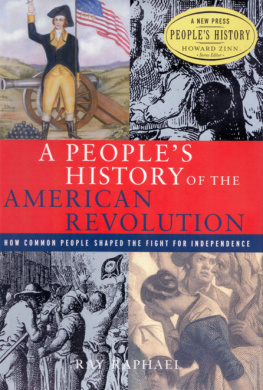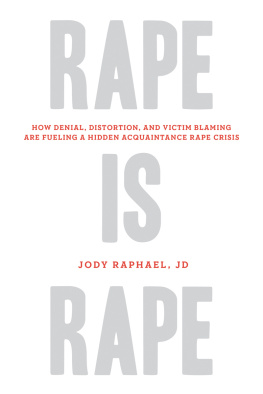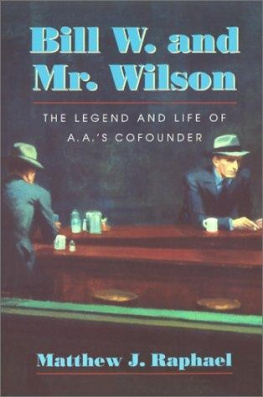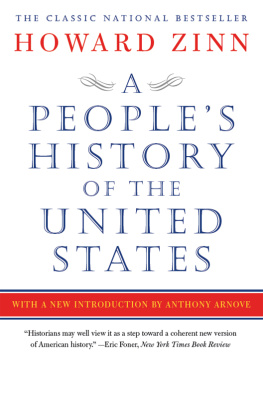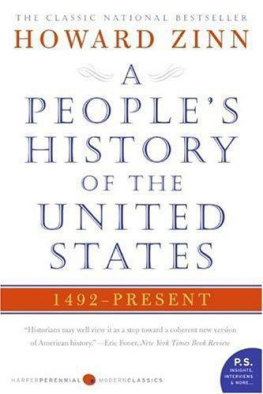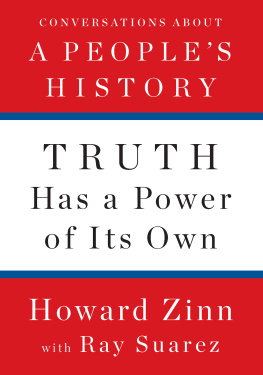A PEOPLES HISTORY OF THE AMERICAN REVOLUTION
ALSO BY RAY RAPHAEL
An Everyday History of Somewhere
Edges: Human Ecology of the Backcountry
Tree Talk: The People and Politics of Timber
Cash Crop: An American Dream?
The Teachers Voice
The Men from the Boys: Rites of Passage in Male America
Little White Father: Redick McKee on the California Frontier
More Tree Talk: The People, Politics, and Economics of Timber
A PEOPLES HISTORY OF THE AMERICAN REVOLUTION
How Common People Shaped the Fight for Independence
A New Press Peoples History
RAY RAPHAEL
SERIES EDITOR
HOWARD ZINN

The New Press, New York
2001 by Ray Raphael
All rights reserved.
No part of this book may be reproduced, in any form, without written permission from the publisher.
Published in the United States by The New Press, New York, 2001
Distributed by W.W. Norton & Company, Inc., New York
LIBRARY OF CONGRESS CATALOGING-IN-PUBLICATION DATA
Raphael, Ray.
A peoples history of the American Revolution : how common people shaped the fight for independence / Ray Raphael.
p. cm.
Includes bibliographical references and index.
ISBN 978-1-5955-8851-7
1. United StatesHistoryRevolution, 17751783Personal narratives 2. United StatesHistoryRevolution, 17751783Social aspects. I. Title.
E275.A2 R37 2001
973.3'092'2dc21 00062039
The New Press was established in 1990 as a not-for-profit alternative to the large, commercial publishing houses currently dominating the book publishing industry. The New Press operates in the public interest rather than for private gain, and is committed to publishing, in innovative ways, works of educational, cultural, and community value that are often deemed insufficiently profitable.
The New Press, 450 West 41st Street, 6th floor, New York, NY 10036
www.thenewpress.com
246897531
For Marie
CONTENTS
The research for A Peoples History of the American Revolution was made possible in part by a fellowship from the National Endowment for the Humanities.
Turning history on its head opens up whole new worlds of possibility. Once, historians looked only at societys upper crust: the leaders and others who made the headlines and whose words and deeds survived as historical truth. In our lifetimes, this has begun to change. Shifting historys lens from the upper rungs to the lower, we are learning more than ever about the masses of people who did the work that made society tick.
Not surprisingly, as the lens shifts the basic narratives change as well. The history of men and women of all classes, colors, and cultures reveals an astonishing degree of struggle and independent political action. Everyday people played complicated historical roles, and they developed highly sophisticated and often very different political ideas from the people who ruled them. Sometimes their accomplishments left tangible traces; other times, the traces are invisible but no less real. They left their mark on our institutions, our folkways and language, on our political habits and vocabulary. We are only now beginning to excavate this multifaceted history.
The New Press Peoples History Series will roam far and wide through human history, revisiting old stories in new ways, and introducing altogether new accounts of the struggles of common people to make their own history. Taking the lives and viewpoints of common people as its point of departure, the series will reexamine subjects as different as the Renaissance, the Industrial Revolution, the Cold War, the settlement of the New World, World War Two, and the American Civil War.
A peoples history does more than add to the catalog of what we already know. These books will shake up readers understanding of the pastjust as common people throughout history have shaken up their always changeable worlds.
Howard Zinn
Boston, 2000
R eal people, not paper heroes, made and endured the American Revolution. Witness:
In September of 1776, when the Reverend Ammi R. Robbins was making his rounds among patients of the Continental Army, he came upon one very sick youth from Massachusetts who asked the reverend to save him because he felt he was not fit to die. Do, sir, pray for me, pleaded the youth, whose name and age were not reported. Will you not send for my mother? If she were here to nurse me I could get well. O my mother, how I wish I could see her; she was opposed to my enlisting: I am now very sorry. Do let her know I am sorry! Robbins did not send for the boys mother; instead, he endeavored to point him to the only source of peace, prayed and left him; he cannot live long.
In 1773, as white patriots complained they were being reduced to a state of slavery, four African Americans from Massachusetts petitioned a member of the assembly:
Sir, The efforts made by the legislative of this province in their last sessions to free themselves from slavery, gave us, who are in that deplorable state, a high degree of satisfaction. We expect great things from men who have made such a noble stand against the designs of their fellow-men to enslave them.
The slaves were only requesting one day a week to labor for themselves, but the assembly took no action.
In June of 1776, fifteen-year-old Joseph Plumb Martin threatened to run off and board a privateer if his grandparents did not allow him to enlist in the army. Despite some misgivings, he wanted someday to come swaggering back to tell tales of his hair-breadth scapes. All his older friends were signing up, and Joseph did not wish to be left behind:
I one evening went off with a full determination to enlist at all hazards. When I arrived at the place of rendezvous I found a number of young men of my acquaintance there. The old bantering began. Come, if you will enlist, I will, says one. You have long been talking about it, says another. Come, now is the time. Thinks I to myself, I will not be laughed into it or out of it. I will act my own pleasure after all. But what did I come here for tonight? Why, to enlist. Then enlist I will. So seating myself at the table, enlisting orders were immediately presented to me. I took up the pen, loaded it with the fatal charge, made several mimic imitations of writing my name, but took especial care not to touch the paper with the pen until an unlucky wight who was leaning over my shoulder gave my hand a stroke, which caused the pen to make a woeful scratch on the paper. O, he has enlisted, said he. He has made his mark; he is fast enough now. Well, thought I, I may as well go through with this business now as not. So I wrote my name fairly upon the indentures. And now I was a soldier, in name at least, if not in practice.
Dr. Abner Beebe of East Haddam, Connecticut, was known to speak very freely in favor of the Crown. Although he had committed no other crime,
Two months before the battles of Lexington and Concord, the British sent Colonel Leslie with 240 men to seize arms and ammunition which the rebels had stored in Salem. As the troops approached town, residents halted their progress by lifting the Northfield drawbridge. Several inhabitants climbed onto the raised leaf of the bridge and engaged in a shouting match with Colonel Leslie on the other side. William Gavett, an eyewitness, reported the incident:
In the course of the debate between Colonel Leslie and the inhabitants, the colonel remarked that he was upon the Kings Highway and would not be prevented passing over the bridge.
Old Mr. James Barr, an Englishman and a man of much nerve, then replied to him: It is
Next page
